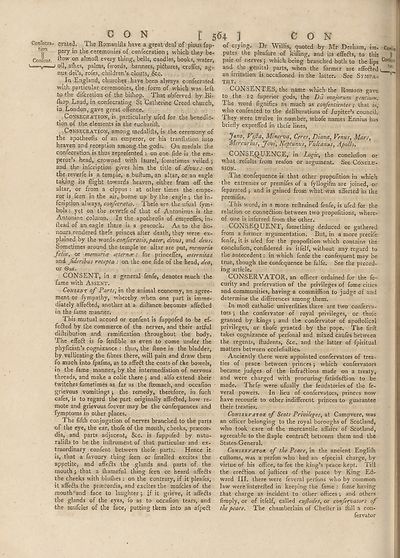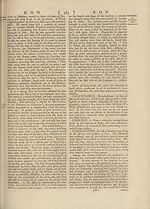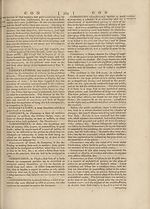Encyclopaedia Britannica, or, a Dictionary of arts, sciences, and miscellaneous literature : enlarged and improved. Illustrated with nearly six hundred engravings > Volume 6, CHI-Crystallization
(610) Page 564
Download files
Complete book:
Individual page:
Thumbnail gallery: Grid view | List view

Confecra
tion
CON t 56+ ]
The Romanics have a great deal of pious fop- of crying.
crated.
pery in the ceremonies of confecration -7 which they be-
Conlent. ^.ow on almoft every thing, bells, candles, books, water,
==“'v—■—> oil, alhes, palms, fwords, banners, pictures, crcffes, ag-
nus dei’s, rofes, children’s clouts, &c.
In England, churches have been always confecrated
with particular ceremonies, the form of which was left
to the difcretion of the bithop. That obferved by Bi-
fliop l.aud, in confecrating St Catherine Creed church,
ia London, gave great offence.
Consecration, is particularly ufed for the benedic¬
tion of the elements in the eucharift.
Consecration, among medaliils, is the ceremony of
the apotheofts of an emperor, or his tranllation into
heaven and reception among the gods. On medals the
confecration is thus reprefented : on one fide is the em¬
peror’s head, crowned Xvith laurel, fometimes veiled ;
and the infcription gives him the title of J/vus: on
the reverie is a temple, a buftum, an altar, or an eagle
taking its flight towards heaven, either from off the
altar, or from a cippus : at other times the empe¬
ror is feen in the air, borne up by the eagle ; the in¬
fcription always, confecratio. Theie are the ufual fym-
bols : yet on the reverfe of that of Antoninus is the
Antonine column. In the apotheofis of empreffes, in-
ffead of an eagle there is a peacock. As to the ho¬
nours rendered thefe princes after death, they were ex¬
plained by the words confecratio, pater^ divas, and deus.
Sometimes around the temple or altar are put, memoria
feiix, or tnemorue ceternae: for princeffes, ceternitas
and Jidenbus recepta : on the one fide of the head, dea,
or
^ CONSENT, in a
fame with Assent.
Consent of Parts, in the animal economy, an agree¬
ment or fympathy, whereby when one part is imme¬
diately affefted, another at a diftance becomes affe&ed
in the fame manner.
This mutual accord or confent is fuppofed to be ef-
fe£led by the commerce of the nerves, and their artful
cifiribution and ramification throughout the body.
The effefl: is fo fenfible as even to come under the
phyfician’s cognizance : thus, the Hone in the bladder,
by vellicating the fibres there, will pain and draw them
fo much into fpafms, as to affeft the coats of the bowels,
in the fame manner, by the intermediation of nervous
threads, and make a colic there j and alfo extend their
twitches lometimes as far as the ftomaeh, and occafion
grievous vomitings j the remedy, therefore, in fuch
cafes, is to regard the part originally affe&ed, how re¬
mote and grievous foever may be the confequences and
fymptoms in other places.
The fifth conjugation of nerves branched to the parts
of the eye, the ear, thofe of the mouth, cheeks, praecor-
dia, and parts adjacent, &c. is fuppoled by natu-
ralifts to be the inftrument of that particular' and ex¬
traordinary confent between thofe parts. Hence it
is, that a favoury thing feen or fmelled excites the
appetite, and affe&s the glands and parts of. the
mouth $ that a lhameful thing feen or heard affedts
the cheeks with blufhes : on the contrary, if it pleafes,
it aftefts the praecordia, and excites the mufcles of the
mouth and face to laughter; ;f it grieve, it affedts
the glands of the eyes, fo as to occafion tears, and
the mufcles of the face, putting them into an afpedt
general fenfe, denotes much the
CON
Dr Wilhs, quoted by Mr Derham, im¬
putes the pleafure of killing, and its effedts, to this
pair oi nerves 5 which being branched both to the lips
and the genital parts, when the former are affedled
an irritation is occafioned in the latter. See Sympa¬
thy.
CONSENT ES, the name which the Romans gave
to the 12 fuperior gods, the Dii tnajorum gentium.
I he word fignifies as much as confermentes; that is,
who coniented to the deliberations of Jupiter’s council.
They were twelve in number, whofe names Ennius has
briefly expreffed in thefe lines,
fa, Minerva, Ceres, Diana, Venus, Mars,
Mercunus, fovi, Neptunus, Vulcanus, Apollo.
^ CONSEQ UENCE, in Logic, the conclufion or
what reliilts Irom reafon or argument. See Conclu¬
sion.
Ine confequence is that other propofition in which
the extremes or premifes of a fyllogilfn are joined, or
feparated ; and is gained from what was afferted in the
premifes.
1 his word, in a more reftrained fenfe, is ufed for the
relation or connedtion between two propofitions, where¬
of one is inferred from the other.
CONSEQUENT, fomething deduced or gathered
from a former argumentation. But, in a more precife
fenfe, it is uied for the propofition which contains the
conclufion, confidered in itlelf, without any regard to
the antecedent: in which fenfe the confequent may be
true, though the confequence be falfe. See the preced¬
ing article.
CONSERVATOR, an officer ordained for the fe-
curity and prefervation of the privileges of fome cities
and communities, having a commiflion to judge of and
determine the differences among them.
In moft catholic univerfities there are two' conferva-
tors j the confervator of royal privileges, or thoie
granted by kings ; and the confervator of apofiolscal
privileges, or thofe granted by the pope. The firft
takes cognizance of perfonal and mixed caufes between
the regents, Undents, &c. and the latter of fpiritual
matters between ecclefiaftics.
Anciently there were appointed confervators of trea¬
ties of peace between princes; which confervators
became judges of the inflations made on a treaty,
and were charged with procuring fatisfation to be
made. Thefe were ufually the feudatories of the le-
veral powers. In lieu of confervators, princes now
have recourfe to other indifferent princes to guarantee
their treaties.
Con serf 47 or of Scots Privileges, at Campvere, was
an officer belonging to the royal boroughs of Scotland,
who took care of the mercantile affairs of Scotland,
agreeable to the ftaple contraft between them and the
States-General.
Conservator of the Peace, in the ancient Englilh
culloms, was a perfon who had an efpecial charge, by
virtue of his office, to fee the king’s peace kept. Till
the ereftion of juftices of the peace by King Ed¬
ward III. there were feveral perfons who by common
law were interefted in keeping the fame : fome having
that charge as incident to other offices ; and others
limply, or of itfelf, called cufodes, or confervators of
the peace. The chamberlain of Chefttr is ftill a con¬
fervator
Confen
o 'I
Ccmferv
tor,
tion
CON t 56+ ]
The Romanics have a great deal of pious fop- of crying.
crated.
pery in the ceremonies of confecration -7 which they be-
Conlent. ^.ow on almoft every thing, bells, candles, books, water,
==“'v—■—> oil, alhes, palms, fwords, banners, pictures, crcffes, ag-
nus dei’s, rofes, children’s clouts, &c.
In England, churches have been always confecrated
with particular ceremonies, the form of which was left
to the difcretion of the bithop. That obferved by Bi-
fliop l.aud, in confecrating St Catherine Creed church,
ia London, gave great offence.
Consecration, is particularly ufed for the benedic¬
tion of the elements in the eucharift.
Consecration, among medaliils, is the ceremony of
the apotheofts of an emperor, or his tranllation into
heaven and reception among the gods. On medals the
confecration is thus reprefented : on one fide is the em¬
peror’s head, crowned Xvith laurel, fometimes veiled ;
and the infcription gives him the title of J/vus: on
the reverie is a temple, a buftum, an altar, or an eagle
taking its flight towards heaven, either from off the
altar, or from a cippus : at other times the empe¬
ror is feen in the air, borne up by the eagle ; the in¬
fcription always, confecratio. Theie are the ufual fym-
bols : yet on the reverfe of that of Antoninus is the
Antonine column. In the apotheofis of empreffes, in-
ffead of an eagle there is a peacock. As to the ho¬
nours rendered thefe princes after death, they were ex¬
plained by the words confecratio, pater^ divas, and deus.
Sometimes around the temple or altar are put, memoria
feiix, or tnemorue ceternae: for princeffes, ceternitas
and Jidenbus recepta : on the one fide of the head, dea,
or
^ CONSENT, in a
fame with Assent.
Consent of Parts, in the animal economy, an agree¬
ment or fympathy, whereby when one part is imme¬
diately affefted, another at a diftance becomes affe&ed
in the fame manner.
This mutual accord or confent is fuppofed to be ef-
fe£led by the commerce of the nerves, and their artful
cifiribution and ramification throughout the body.
The effefl: is fo fenfible as even to come under the
phyfician’s cognizance : thus, the Hone in the bladder,
by vellicating the fibres there, will pain and draw them
fo much into fpafms, as to affeft the coats of the bowels,
in the fame manner, by the intermediation of nervous
threads, and make a colic there j and alfo extend their
twitches lometimes as far as the ftomaeh, and occafion
grievous vomitings j the remedy, therefore, in fuch
cafes, is to regard the part originally affe&ed, how re¬
mote and grievous foever may be the confequences and
fymptoms in other places.
The fifth conjugation of nerves branched to the parts
of the eye, the ear, thofe of the mouth, cheeks, praecor-
dia, and parts adjacent, &c. is fuppoled by natu-
ralifts to be the inftrument of that particular' and ex¬
traordinary confent between thofe parts. Hence it
is, that a favoury thing feen or fmelled excites the
appetite, and affe&s the glands and parts of. the
mouth $ that a lhameful thing feen or heard affedts
the cheeks with blufhes : on the contrary, if it pleafes,
it aftefts the praecordia, and excites the mufcles of the
mouth and face to laughter; ;f it grieve, it affedts
the glands of the eyes, fo as to occafion tears, and
the mufcles of the face, putting them into an afpedt
general fenfe, denotes much the
CON
Dr Wilhs, quoted by Mr Derham, im¬
putes the pleafure of killing, and its effedts, to this
pair oi nerves 5 which being branched both to the lips
and the genital parts, when the former are affedled
an irritation is occafioned in the latter. See Sympa¬
thy.
CONSENT ES, the name which the Romans gave
to the 12 fuperior gods, the Dii tnajorum gentium.
I he word fignifies as much as confermentes; that is,
who coniented to the deliberations of Jupiter’s council.
They were twelve in number, whofe names Ennius has
briefly expreffed in thefe lines,
fa, Minerva, Ceres, Diana, Venus, Mars,
Mercunus, fovi, Neptunus, Vulcanus, Apollo.
^ CONSEQ UENCE, in Logic, the conclufion or
what reliilts Irom reafon or argument. See Conclu¬
sion.
Ine confequence is that other propofition in which
the extremes or premifes of a fyllogilfn are joined, or
feparated ; and is gained from what was afferted in the
premifes.
1 his word, in a more reftrained fenfe, is ufed for the
relation or connedtion between two propofitions, where¬
of one is inferred from the other.
CONSEQUENT, fomething deduced or gathered
from a former argumentation. But, in a more precife
fenfe, it is uied for the propofition which contains the
conclufion, confidered in itlelf, without any regard to
the antecedent: in which fenfe the confequent may be
true, though the confequence be falfe. See the preced¬
ing article.
CONSERVATOR, an officer ordained for the fe-
curity and prefervation of the privileges of fome cities
and communities, having a commiflion to judge of and
determine the differences among them.
In moft catholic univerfities there are two' conferva-
tors j the confervator of royal privileges, or thoie
granted by kings ; and the confervator of apofiolscal
privileges, or thofe granted by the pope. The firft
takes cognizance of perfonal and mixed caufes between
the regents, Undents, &c. and the latter of fpiritual
matters between ecclefiaftics.
Anciently there were appointed confervators of trea¬
ties of peace between princes; which confervators
became judges of the inflations made on a treaty,
and were charged with procuring fatisfation to be
made. Thefe were ufually the feudatories of the le-
veral powers. In lieu of confervators, princes now
have recourfe to other indifferent princes to guarantee
their treaties.
Con serf 47 or of Scots Privileges, at Campvere, was
an officer belonging to the royal boroughs of Scotland,
who took care of the mercantile affairs of Scotland,
agreeable to the ftaple contraft between them and the
States-General.
Conservator of the Peace, in the ancient Englilh
culloms, was a perfon who had an efpecial charge, by
virtue of his office, to fee the king’s peace kept. Till
the ereftion of juftices of the peace by King Ed¬
ward III. there were feveral perfons who by common
law were interefted in keeping the fame : fome having
that charge as incident to other offices ; and others
limply, or of itfelf, called cufodes, or confervators of
the peace. The chamberlain of Chefttr is ftill a con¬
fervator
Confen
o 'I
Ccmferv
tor,
Set display mode to:
![]() Universal Viewer |
Universal Viewer | ![]() Mirador |
Large image | Transcription
Mirador |
Large image | Transcription
Images and transcriptions on this page, including medium image downloads, may be used under the Creative Commons Attribution 4.0 International Licence unless otherwise stated. ![]()
| Permanent URL | https://digital.nls.uk/193015353 |
|---|
| Attribution and copyright: |
|
|---|
| Description | Ten editions of 'Encyclopaedia Britannica', issued from 1768-1903, in 231 volumes. Originally issued in 100 weekly parts (3 volumes) between 1768 and 1771 by publishers: Colin Macfarquhar and Andrew Bell (Edinburgh); editor: William Smellie: engraver: Andrew Bell. Expanded editions in the 19th century featured more volumes and contributions from leading experts in their fields. Managed and published in Edinburgh up to the 9th edition (25 volumes, from 1875-1889); the 10th edition (1902-1903) re-issued the 9th edition, with 11 supplementary volumes. |
|---|---|
| Additional NLS resources: |
|

